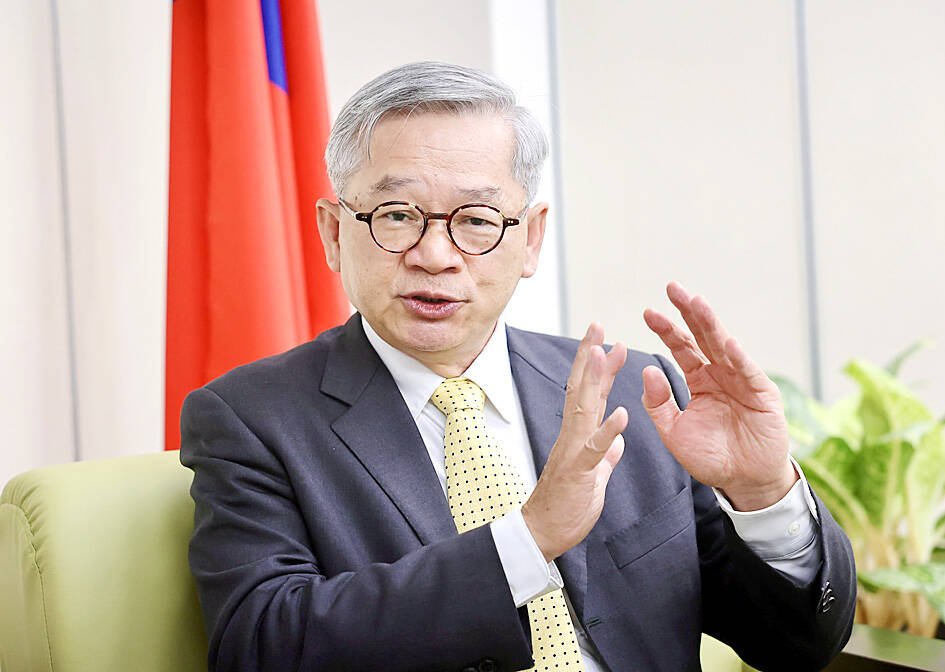The National Science and Technology Council (NSTC) is in talks with Amazon.com to collaborate on its Project Kuiper that would complete Taiwan’s low Earth orbit (LEO) communications satellite network, NSTC Minister Wu Cheng-wen (吳誠文) said.
Wu made the remarks in a media interview, adding that Taiwanese businesses are also hoping to play an important role in Kuiper’s satellite production, and that Taiwan’s technology would improve quickly through its cooperation with the US, which possesses some of the world’s top satellite design capabilities.
Taiwan is also seeking to collaborate with Kuiper on optical inter-satellite link communication technologies, which allow satellites to exchange information rapidly without a ground intermediary, sources said.

Photo: CNA
The technology supports communications for remote areas and helps to maintain basic communications in case ground systems are disconnected.
The plans go hand-in-hand with the third phase of Taiwan’s national space program, whose revision is expected to be approved by the Cabinet in the near future, Wu said.
The third phase, originally projected to run from 2019 to 2028, was aimed at launching one satellite per year for national security and environmental monitoring purposes.
The NSTC proposed a revision last year with a budget of more than NT$40 billion (US$1.33 billion) to extend the third phase to 2031 to adapt to the rapid changes in LEO distribution and commercialization.
Should the revised version be carried out, it would include two self-developed experimental satellites and four satellites developed in collaboration with the industrial sector, which would also be a part of Taiwan’s satellite network.
The first experimental satellite would be scheduled to be launched in 2027, while the four collaborative satellites would be scheduled for launch as early as 2029.
A rocket research and development base would also be established in Tainan as part of the space program, with construction scheduled to begin in as early as next year, Wu said.
However, the base would not be used for ignition and launching tests, he said.
Another feature of the third phase revision is the commercialization of various aspects of the program.
The Taiwan Space Agency (TASA) would collaborate with the private sector to create a supply chain for the space industry extending from system design to component manufacturing, Wu said.
Yet while there will be new opportunities, businesses would still have to develop new skills because the ground and terminal equipment used for communications satellites have different specifications from standard ground equipment Taiwanese businesses are familiar with, he said.
As a result, in addition to startups joining the supply chain, many IC design companies and electronics manufacturers are expressing interest in participating, eyeing the prospects of satellite applications, he said.
The NSTC also hopes to connect with international partners, including in the US, Europe and Japan, and develop global markets together, Wu said.

SHIPS, TRAINS AND AUTOMOBILES: The ministry has announced changes to varied transportation industries taking effect soon, with a number of effects for passengers Beginning next month, the post office is canceling signature upon delivery and written inquiry services for international registered small packets in accordance with the new policy of the Universal Postal Union, the Ministry of Transportation and Communications said yesterday. The new policy does not apply to packets that are to be delivered to China, the ministry said. Senders of international registered small packets would receive a NT$10 rebate on postage if the packets are sent from Jan. 1 to March 31, it added. The ministry said that three other policies are also scheduled to take effect next month. International cruise ship operators

NUMBERS IMBALANCE: More than 4 million Taiwanese have visited China this year, while only about half a million Chinese have visited here Beijing has yet to respond to Taiwan’s requests for negotiation over matters related to the recovery of cross-strait tourism, the Tourism Administration said yesterday. Taiwan’s tourism authority issued the statement after Chinese-language daily the China Times reported yesterday that the government’s policy of banning group tours to China does not stop Taiwanese from visiting the country. As of October, more than 4.2 million had traveled to China this year, exceeding last year. Beijing estimated the number of Taiwanese tourists in China could reach 4.5 million this year. By contrast, only 500,000 Chinese tourists are expected in Taiwan, the report said. The report

The Forestry and Nature Conservation Agency yesterday launched a gift box to market honey “certified by a Formosan black bear” in appreciation of a beekeeper’s amicable interaction with a honey-thieving bear. Beekeeper Chih Ming-chen (池明鎮) in January inspected his bee farm in Hualien County’s Jhuosi Township (卓溪) and found that more than 20 beehives had been destroyed and many hives were eaten, with bear droppings and paw prints near the destroyed hives, the agency said. Chih returned to the farm to move the remaining beehives away that evening when he encountered a Formosan black bear only 20m away, the agency said. The bear

HORROR STORIES: One victim recounted not realizing they had been stabbed and seeing people bleeding, while another recalled breaking down in tears after fleeing A man on Friday died after he tried to fight the knife-wielding suspect who went on a stabbing spree near two of Taipei’s busiest metro stations, Taipei Mayor Chiang Wan-an (蔣萬安) said. The 57-year-old man, identified by his family name, Yu (余), encountered the suspect at Exit M7 of Taipei Main Station and immediately tried to stop him, but was fatally wounded and later died, Chiang said, calling the incident “heartbreaking.” Yu’s family would receive at least NT$5 million (US$158,584) in compensation through the Taipei Rapid Transit Corp’s (TRTC) insurance coverage, he said after convening an emergency security response meeting yesterday morning. National